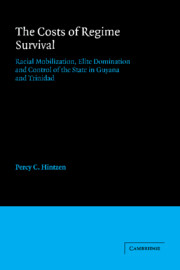 The Costs of Regime Survival
The Costs of Regime Survival Published online by Cambridge University Press: 08 October 2009
Nationalism and class mobilization: the initial phase
It was argued in Chapter 1 that when the structure of colonial organization is centered around the colonial bureaucracy, which functions as an instrument of power and domination socio-political change can come about only through mass mobilization. To be successful, such mobilization must be capable of disrupting colonial order and placing metropolitan interests in jeopardy. Mass mobilization is made necessary because of the rigid and impenetrable boundary separating the colonizer and the colonized and the closed nature of the political and social systems.
Mass mobilization is not invariably directed at the securing of socio-political reform; its objectives could remain confined to issues of economic and material welfare if the movement that inspires it does not become politicized. For politicization to occur, there must exist a group of leaders who are able to transform objective demands into political issues usually through the use of ideology. When the basis for initial discontent is economic and material, such an ideology must, of necessity, take on a class character. Ideology might also assume a nationalist character when the object of demands for change is a colonizing elite or a colonial power. Since colonialism implies class domination, nationalism can quite easily be appended to a class-based ideology.
Demands for change to a more representative government or for independence under a nationalist government also assume the existence of an elite with the wherewithal to take over administrative, legislative, and judicial functions from the colonial power.
To save this book to your Kindle, first ensure [email protected] is added to your Approved Personal Document E-mail List under your Personal Document Settings on the Manage Your Content and Devices page of your Amazon account. Then enter the ‘name’ part of your Kindle email address below. Find out more about saving to your Kindle.
Note you can select to save to either the @free.kindle.com or @kindle.com variations. ‘@free.kindle.com’ emails are free but can only be saved to your device when it is connected to wi-fi. ‘@kindle.com’ emails can be delivered even when you are not connected to wi-fi, but note that service fees apply.
Find out more about the Kindle Personal Document Service.
To save content items to your account, please confirm that you agree to abide by our usage policies. If this is the first time you use this feature, you will be asked to authorise Cambridge Core to connect with your account. Find out more about saving content to Dropbox.
To save content items to your account, please confirm that you agree to abide by our usage policies. If this is the first time you use this feature, you will be asked to authorise Cambridge Core to connect with your account. Find out more about saving content to Google Drive.